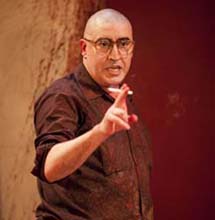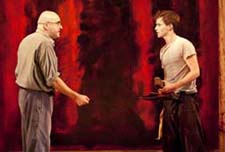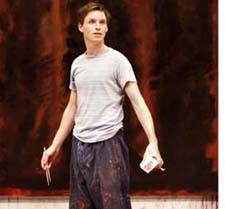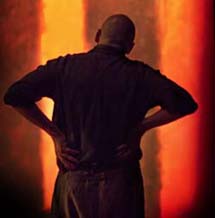Lucy Komisar
"Red" a stunning
look into painter Rothko's art and psyche
"Red."
Written by John Logan; directed by Michael Grandage.
Golden Theatre, 252 West 45th Street, New York City.
212-239-6200.
Opened April 1, 2010; closes June 27, 2010.
http://redonbroadway.com/
Reviewed by Lucy Komisar April 8, 2010.
Can an art lecture in the form of a theater piece push you to
the edge of your seat? This rich, engrossing play by John Logan
does! Painter Mark Rothko's inflated sense of self collides
with the challenges of youth's new visions in Logan's fascinating
pas de deux about the meaning of art and its indelible connection
to commerce.
 |
| Alfred
Molina. Photo by Johan Persson. |
It's 1958 and Rothko (Alfred Molina) has received
a $35,000 commission ($2 million in today's money) for a series
of murals to be placed in the new upscale restaurant The Four
Seasons on Park Avenue. (Not mentioned in the play, it's called
The Four Seasons because it will be redecorated for summer-fall-winter-spring,
an in-your-face reminder that money is no object.)
So art collides with money and the worship of money. And that
gets confused with the judgment of art.
We see Rothko in his studio on the Bowery at Prince Street on
the Lower East Side. At the side is a shabby discolored white
cupboard holding paint jars, and at the center there will shortly
loom a huge canvas.
Molina as Rothko is intense, unsmiling, overwhelming. He compares
himself to Rembrandt, Turner, Michaelangelo, and Matisse. Contemplating
them, he thinks about his own place in art history. We get inside
the competitive soul of the painter. Rothko declares, "Courage
in painting isn't facing the blank canvas, it's facing Manet."
 |
| Alfred
Molina and Eddie Redmayne. Photo by Johan Persson. |
He asks his young assistant Ken (Eddie Redmayne),
"Where's the discernment? Where's the arbitration that
separates what I like from what I respect, what I deem worthy,
what has .. listen to me now … significance." There's
no discernment exhibited by the fans of the trendy moderns,
he suggests.
He attacks Picasso for doing art for money. Yet he is ironic
about his own work, ridiculing people who say, "All those
fuzzy rectangles, my kid could do that in kindergarten, it's
nothing but a scam, this guy's a fraud," but "Still,
they buy it … It's an investment. It's screwing the neighbors.
It's buying class … It's buying taste … It goes
with the lamp … It's cheaper than a Pollock. It's interior
decoration … It's anything but what it is."
Always art and money. He hates the pop moderns, Jasper Johns,
Lichtenstein, Warhol, Frank Stella. "Comic books and soup
cans… Galleries will do anything for money." But
maybe he is angry at the reality when Ken tells him that Pop
Art has banished Abstract Expressionism. Rothko likes music
in the background, but he is furious when Ken plays a recording
of jazz trumpeter Chet Baker, instead of opera. But, of course,
Ken also likes Pollack and Picasso.
 |
| Eddie
Redmayne. Photo by Johan Persson. |
The conversation about art – about the texture,
the psychology of colors, the historical underpinnings —
is lush, like a symphony. And jagged, like jazz. Director Michael
Grandage maintains a pace as bracing as an action film.
Of course, one might also challenge the notion that Rothko's
fuzzy rectangles are great art. The painting he is working on
is a huge rectangular red on red. He asks Ken, "What does
it need?" The kid says, "Red," and Rothko erupts
in fury. We see the growth and assertiveness of the young acolyte.
They race to prime the canvass in red. Judge the art for yourself.
Rothko feels that he is always being judged. And underlying
everything is the sense that he is emotionally on edge.
The painter's sense of inferiority is set off by a visit to
The Four Seasons. He feels too fat, too Jewish. He hates the
fact of "everyone looking at everyone else all the time,
like predators — who are you? What are you worth? Do I
need to fear you? Do I need to acquire you?"
 |
| Alfred
Molina as Rothko looking at his painting. Photo by Johan
Persson. |
He wonders if putting his painting there is immoral,
corrupt, "Am I feeding the whims of the bourgeoisie?"
He wants to ruin the appetite of the rich who come to dine.
He wants to be more than someone slapping on paint. He tells
Ken, "I am here to stop your heart, I am here to make you
think! I am not here to make pretty pictures!"
Logan's look into Rothko's art and psyche is as pretty a theatrical
picture as you will find on the stage.


